
Senthuran Selvakumaran has been trying to immigrate to Canada since 2005, but the CBSA has denied his application on the grounds he was a member of the Tamil Tigers.
Federal Court
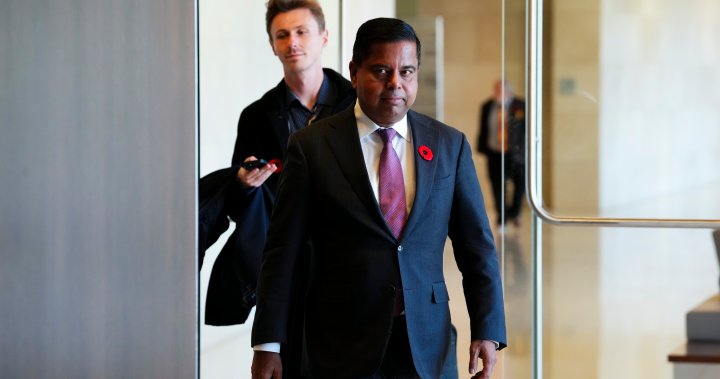

Before he was appointed to the federal cabinet two years ago, Public Safety Minister Gary Anandasangaree wrote letters urging Canadian officials to approve the immigration application of a man they had determined was a member of a terrorist organization.
The letters, dated 2023 and 2016, were written on Anandasangaree’s House of Commons letterhead and sent to the Canada Border Services Agency on behalf of an alleged member of Sri Lanka’s Tamil Tigers who wanted to move to Toronto.
Although Canadian immigration officials had repeatedly rejected Senthuran Selvakumaran as an immigrant due to what they described as his “protracted involvement” in the Tigers, Anandasangaree asked them to reverse their decision.
Also known as the Liberation Tigers of Tamil Eelam, or LTTE, the Tamil Tigers fought a lengthy civil war against the Sri Lankan government. The conflict ended in 2009 but the Tigers remain on Canada’s list of terrorist organizations.
In his most recent letter to the CBSA, Anandasangaree said the agency’s refusal to grant Selvakumaran permanent residence had separated the 48-year-old Sri Lankan from his Canadian wife and child, which the Toronto-area MP called “cruel and inhumane.”
“I respectfully ask that you review and reconsider this decision,” Anandasangaree wrote on July 19, 2023, when he was in the last days of his term as Parliamentary Secretary to the Minister of Justice and Attorney General.
Anandasangaree’s constituency assistant emailed the letter directly to the law firm representing Selvakumaran in his case against the government on July 25, 2023, according to records on the case released to Global News.
The following day, Anandasangaree received his first cabinet appointment as Minister of Crown-Indigenous Relations in the government of Prime Minister Justin Trudeau. He was sworn in as Public Safety Minister on May 13.

Asked about the matter, Anandasangaree said in a statement on Monday that it would not be appropriate to comment on a matter before the courts but that the “letters in question here date from before I entered cabinet.”
“As minister, I have never sent a letter seeking ministerial relief in an immigration matter. When I was appointed minister in July 2023, I instructed my constituency staff to no longer provide such letters,” he said.
Read the minister’s full statement here
In his new portfolio, Anandasangaree has been given the task of helping fend off a White House trade war by bringing in legislation to toughen Canada’s borders, which President Donald Trump has complained are a threat to the United States.
But documents on Selvakumaran’s case suggest that Anandasangaree’s support for the would-be migrant may have put Canadian public safety officials in a potentially awkward position: standing up for border security against the wishes of the MP who is now their minister.
The recommendation to deny Selvakumaran’s application for permanent residence was signed on Oct. 12, 2023, by Erin O’Gorman, the president of the CBSA, who now reports to Anandasangaree.
Her report mentioned a “letter from Canadian Member of Parliament Gary Anandasangaree, wherein the MP expresses his support for reunification of Mr. Selvakumaran’s family in Canada.”
She wrote that the letter was among several factors border officials took into account before coming to their decision, but that the CBSA’s “predominant considerations” were national security and public safety.
The minister’s involvement in the case came to light as a result of a court challenge launched by Selvakumaran, who used Anandasangaree’s endorsement to bolster his bid to join his family in Canada.
On Wednesday, the Federal Court rejected his appeal. The judge’s decision said the evidence put forward by Selvakumaran included a letter of support from an MP, whom she did not name.
Global News reviewed the public court file in Ottawa and found it contained two letters signed by Anandasangaree in which he identified himself as a Member of Parliament.
“MP Gary Anandasangaree supported Mr. Selvakumaran’s application for ministerial relief prior to taking on his current ministerial role,” Lorne Waldman, Selvakumaran’s Toronto lawyer, said on Monday.
“Members of Parliament often choose to do so when approached by their constituents who have compelling circumstances, and there is nothing improper in doing so.”
Waldman said he was disappointed with the court’s ruling. He said his client “made a mistake well over two decades ago and claimed refugee status in the United Kingdom based on a false story of relatively low-level involvement with the LTTE.”
“He and his family have been attempting to correct the record and ask for compassionate consideration since 2007. The family will continue to suffer due to the court’s decision.”
Prime Minister Mark Carney’s office did not respond to questions by deadline.
In his statement to Global News, Anandasangaree said he had recused himself from decisions related to the Tamil Tigers and the World Tamil Movement, which Public Safety Canada alleges is its Canadian front organization.
The recusal was a a response to what “scurrilous and wrong” allegations, Anandasangaree said. He said he would also refrain from making decisions concerning those he had helped before joining cabinet.
“In the discharge of my duties as minister, I cannot, and will not, make decisions on any matter wherein I advocated for a constituent,” he said. “This includes ministerial relief and stays of removals.”
It was a “routine matter” for MPs from all parties to provide letters of support for constituents, he said. But Selvakumaran’s case raised national security questions that are not as straightforward as a typical immigration file.
In his letters of support, Anandasangaree downplayed the CBSA’s concerns about Selvakumaran, calling the decision to bar him from Canada due to his alleged role in the Tamil Tigers an “error.”
He claimed there were “no records … suggesting reasons he might be inadmissible to Canada” — although CBSA officials had compiled a detailed report assessing the evidence they relied on to make their decision.
The CBSA’s report on Selvakumaran said he had acknowledged that he began working for the Tigers in 1992 when he joined a friend who distributed propaganda for the group. He continued doing so until 1998, the report said.
The LTTE attacked civilian centres and assassinated politicians such as Indian Prime Minister Rajiv Gandhi, the CBSA wrote in its report recommending the rejection of Selvakumaran’s application for permanent residence.
The Tigers also ran an “extensive” fundraising, propaganda and arms procurement network in Sri Lanka and “within the Tamil diaspora,” the CBSA wrote in its 29-page report.
The network raised millions for the Tigers in Toronto and other Canadian cities, partly through intimidation and extortion, according to the RCMP. “Although the LTTE was militarily defeated in May 2009, fundraising efforts continue, particularly within the diaspora,” the report said.
Canadian officials are not alleging that Selvakumaran committed any attacks, but said his involvement as a propaganda distributor had “the effect of facilitating the organization’s efforts to spread its messaging at a time to LTTE was actively involved in committing terrorist acts.”
Timeline: Click through a slideshow of photos and documents
In asking the CBSA to approve Selvakumaran’s permanent residence, Anandasangaree’s letters focused on the emotional toll on his family.
Selvakumaran’s daughter was “growing up without both parents,” and lacking “emotional connection to her father,” while his wife, “has endured a lot of emotional and psychological stress over the prolonged separation from her husband,” the MP wrote.
“Separating the family for such a prolonged period of time, and depriving the child of the love and support of both parents is rather cruel and inhumane,” he wrote in his latest letter to the CBSA.
For its part, the CBSA wrote in its report that Selvakumaran’s daughter was born almost a decade after he was informed he was not allowed into Canada due to membership in a terror group.
“It should be noted that Mr. Selvakumaran would have been aware, when he started a family with his wife, that he was inadmissible to Canada; he therefore would have been cognizant of the fact that he might not be in a position to join his wife and daughter,” it said.
Hundreds of pages of Federal Court documents released to Global News describe Selvakumaran’s repeated attempts to immigrate to Canada from Sri Lanka over the past two decades.
Each time, immigration officials rejected him over his alleged membership in the LTTE. His appeals to the courts, in 2012, 2019 and 2024, were all dismissed — most recently last week.
Throughout his dealings with Canada’s immigration system, he has given evolving versions of his past — at first providing details of what he said was his role in the LTTE, and then denying any involvement at all.
He initially sought asylum in the United Kingdom, where he told immigration authorities his duties with the LTTE included delivering the group’s propaganda newspapers from house to house.
He also said he had put up “notices of deceased LTTE members,” according to the CBSA report detailing his immigration history in Canada and the U.K., where he resided from 1998 to 2006.
He got involved “not only because he wanted to help the organization, but also because he was paid for his work,” the CBSA wrote. He later said it was “more of a compulsion by the LTTE that all residents should help them in their offensive against the Sri Lankan armed forces.”
Britain rejected his refugee claim, citing his lack of credibility. The U.K. did not make any finding on whether he was a member of the LTTE. He then married a woman from Canada. The wedding took place in the U.K. He was still living in London when he applied to immigrate as her spouse in 2005.
In 2007, during an interview at the Canadian High Commission in the Sri Lankan capital Colombo, Selvakumaran altered his story but still maintained he had worked for the Tamil Tigers.
The visa officer found that Selvakumaran’s “self-admitted paid work for the organization as articulated in statements to the U.K. authorities, and confirmed in the 2007 interview, serve as a sufficient basis for the refusal on security grounds.”
Following his rejection, Selvakumaran changed his story again. This time he said he had fabricated his account of working for the LTTE as a result of “bad advice.” He also claimed the Canadian visa officer had “intimidated” him.
He began asserting he had “never done any work for the LTTE willingly or for payment.” But immigration officials pointed to holes in his timeline and rejected his permanent residence applications.
On Sept. 1, 2016, he tried a new approach: he applied for “ministerial relief,” a process that allows foreign nationals who are inadmissible to Canada to appeal to the minister of public safety for permanent residence.
He denied ever working for the LTTE, but at the same time said that even if he had, he was not a threat to Canada because his alleged involvement was “non-violent, indirect and extremely limited.”
It’s unclear how the case came to Anandasangaree, who became a Liberal MP in 2015 after stints as a youth activist, lawyer and representative of the Canadian Tamil Congress, a national non-profit group.
Anandasangaree had been in office for less than a year later when he penned his first support letter for Selvakumaran on Sept. 28, 2016. The court decision suggested that Selvakumaran’s wife Nilushie lived in Anandasangaree’s riding.
“The separation has wreaked havoc on Nilushie’s well-being and state of mind causing depression, anxiety and stress,” Anandasangaree wrote, asking the CBSA to contact his office with “any questions or concerns.”
Selvakumaran has argued the family could not live together in Sri Lanka because his wife “regularly becomes ill” when she visits the island. He also pointed to the country’s food, medicine and gas shortages.
The CBSA wrote that while the letters from Anandasangaree and others went in Selvakumaran’s favour, they were outweighed by his “protracted involvement” in a terrorist group at a time it was committing acts of violence.
Anandasangaree’s second letter of support to the CBSA was dated during the time the immigration agency was in the final stages of deciding whether Selvakumaran qualified for ministerial relief.
The letter echoed Selvakumaran’s claims that had been untruthful when he told immigration officials he had worked for the LTTE. “He was wrongfully counseled by his legal representative to lie,” Anandasangaree wrote.
But the CBSA president’s report concluded that Selvakumaran had “not provided a satisfactory explanation to warrant disregarding his initial statements made in the U.K.”
“As such, the CBSA’s assessment of national interest considerations that follows is based on the premise that Mr. Selvakumaran was a member of the LTTE, who engaged in paid work for the organization from 1992 until 1998, as outlined by him in his original account.”
On Jan. 29, 2024, Dominic LeBlanc, who was minister of public safety at the time, signed off on the CBSA’s recommendation that Selvakumaran should be denied ministerial relief.
Selvakumaran appealed his refusal to the Federal Court, but on July 9, Justice Glennys McVeigh ruled he had failed to show the CBSA decision rejecting his application for ministerial relief was unreasonable.
The ruling said the CBSA had “considered positive factors” such as the “letters of support attesting to his good character” but had “reasonably focused” on national security and public safety.

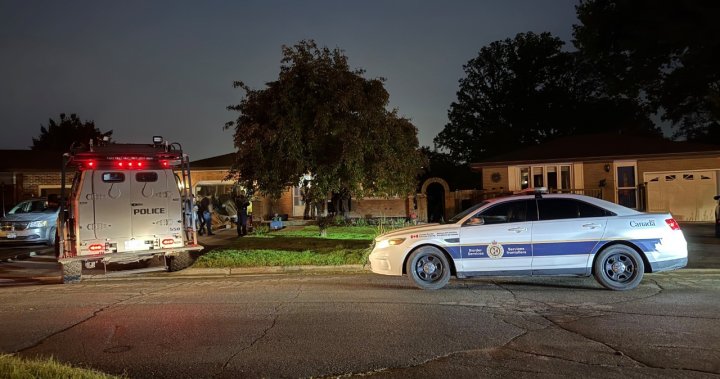
The discovery of gun parts in the mail by the Canada Border Services Agency last year eventually led officers to raid a London home in May, where they seized homemade guns and drugs and arrested two men.
The CBSA says in October 2024, officers at a mail and cargo facility in Mississauga, Ont., discovered a silencer being imported from China. At around the same time, they also seized a 50-round drum magazine coming from the U.S.

Get the day’s top news, political, economic, and current affairs headlines, delivered to your inbox once a day.
The agency says both packages were addressed to the same location, which triggered an investigation into gun parts being imported into Canada.
Six months later, on May 29, the CBSA says officers raided a home in London where officers seized homemade guns, gun parts, a 3D printer, cocaine, carfentanil, oxycodone and boric acid.
Two men from London, aged 33 and 57, are facing a lengthy list of drug and weapon charges following the arrests.
© 2025 Global News, a division of Corus Entertainment Inc.
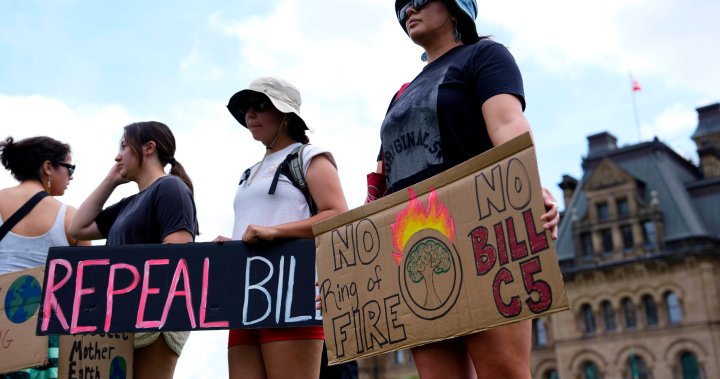
A coalition of Ontario First Nations is taking legal action to try and throw out provincial and federal legislation designed to fast-track major projects, saying the two laws threaten their rights and “ways of life.”
Nine First Nation groups announced in a statement on Tuesday that they are bringing urgent litigation to the Ontario Superior Court of Justice to try and kill Ontario’s Bill 5 and the federal government’s Bill C-5.
The Ford government passed Bill 5 in June, which allows it to create special economic zones where municipal and provincial laws can be suspended. The opposition has referred to the areas as “no-law zones.”
Similarly, the federal Bill C-5 allows cabinet to quickly grant federal approvals for big projects deemed to be in the national interest, such as mines, ports and pipelines, by sidestepping existing laws.
Kate Kempton, senior legal counsel for the group, confirmed to Global News that the litigation was filed Monday evening. It looks to have Bill 5 struck down in its entirety, and the parts of Bill C-5 that allow for major project designation also to be killed.

Get the day’s top news, political, economic, and current affairs headlines, delivered to your inbox once a day.
Alderville First Nation Chief Taynar Simpson said in a statement that the laws cut out local communities from key consultations.
“These laws authorize the Crown governments to approve on a fast track major projects like Ring of Fire mining and pipelines, by short circuiting the need to get critical information about human and environmental safety and impacts,” he said.
“Our case is not a fight against development, it is a fight against dangerous development pushed ahead by factless, thoughtless and reckless decision making from government Ministers behind closed doors with little accountability.”
Attawapiskat First Nation Chief Sylvia Koostachin-Metatawabin pointed out the dangers of using the legislation in the remote, mineral-rich Ring of Fire, in particular.
“In the Ring of Fire area, this could be disastrous,” she said. “That region is peatlands, which is a globally critical carbon sink that must stay intact if it is to counter climate change. If parts of it are destroyed through mining and infrastructure, this could unravel the whole thing.”
The Ford government has confirmed it plans to designate the Ring of Fire as a special economic zone. In June, Premier Doug Ford said he wanted to do that as “quickly as possible.”
He also suggested he would make the James Bay deep-sea port, nuclear power projects, a tunnel under Highway 401 and parts of the GO network special economic zones.
Global News contacted the federal and provincial governments for comment.
© 2025 Global News, a division of Corus Entertainment Inc.

The Beer Store has announced it is closing another 10 stores across Ontario by September, after already announcing the closure of dozens of other stores so far this year.
The most recent list of stores includes two locations in Toronto, one in Ottawa, one in Hamilton, one in Burlington, among other locations.
Last year, the Ford government followed through on a long-term promise to allow convenience stores, grocers and big box retailers to sell a range of alcoholic drinks, including beer.
The plan negotiated a break with The Beer Store, which had previously had an exclusive alcohol retail agreement with the province. It earmarked $225 million for the chain, including measures to reduce store closures.
Under the agreement with the government, at least 300 Beer Store locations must remain open until the end of 2025. After that, there will be no restrictions on shutdowns.
Here is a list of the 10 stores set to close by Sept. 14, 2025:

For news impacting Canada and around the world, sign up for breaking news alerts delivered directly to you when they happen.
“The retail market for beer is changing in Ontario and for The Beer Store that means making the difficult decision to close some retail locations,” said Ozzie Ahmed, VP of Retail. “This is not an easy decision and not one we make lightly.”
The Beer Store had already previously announced four stores would close by June 15, another 11 stores by July 6, then nine more stores by July 20, an additional 10 stores by August 10, and 10 more stores by August 24, as well as the 10 stores just announced by September 14. The latest closures will take the number of shuttered Beer Stores past 80.
It also noted they encourage customers to continue returning empties. More than 1.6 billion alcohol containers were processed at its locations annually.
All grocery stores that sell alcohol will be required to accept the return of empties and refund customer deposits starting on Jan. 1, 2026 as part of provincial regulations, the Beer Store said.
— With files from Global News’ Isaac Callan
© 2025 Global News, a division of Corus Entertainment Inc.


Shop Proud, Eat Proud, Be Proud — Ottawa Canada Day Market This June 28th


Canada’s world junior trial saw juries tossed, intense testimony. Here’s a recap


Measles circulating in northeastern B.C. community, health officials warn
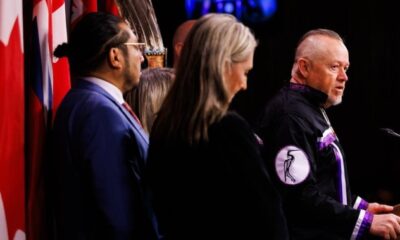

Anishinabek Nation chief says he briefed Ontario police on protests against Bill 5


Ring of Fire road to bring prosperity to First Nation, problems for caribou: report
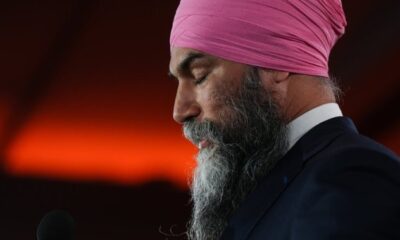

Jagmeet Singh apologizes for attending Kendrick Lamar concert after Drake calls him out


Dreaming of a lakeside cottage but can’t afford it? Co-ownership could open that door


Former major leaguer, Jays doctor Ron Taylor dies